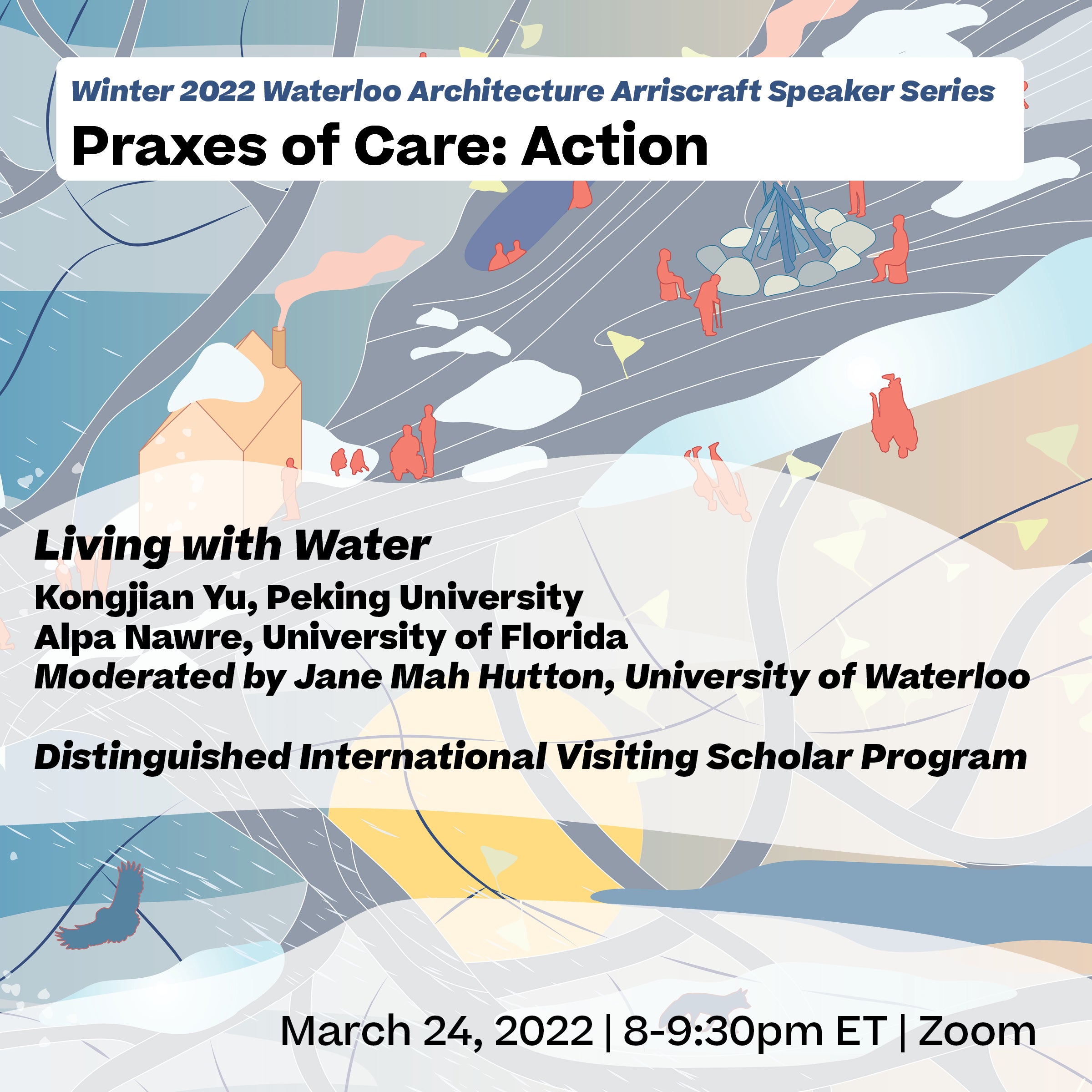
In Honour of Andrew Levitt, celebrating the legacy of a Professor Emeritus dedicated to teaching on care, and with care.
Please join us for Living with water, the final of five conversations on the theme of action, with speakers Kongjian Yu, Peking University, and Alpa Nawre, University of Florida. Their short presentations will be followed by a discussion moderated by Jane Mah Hutton, University of Waterloo.
Praxes of Care asks, “what is an architecture of care?” Over four terms–Fall 2021 to Winter 2023–a series of conversations will bring together two or more architects, designers, researchers, artists, activists, and care workers to discuss care processes according to the themes of Attention, Action, Communication, and Maintenance. The series is curated by faculty, staff, and representatives of student groups: Treaty Lands Global Stories, Bridge, and the Sustainability Collective. Recent calls for change have shifted the discipline toward the underlying social and ecological processes enabled by the production of architecture. By listening to and learning about care practices from interdisciplinary perspectives, we can begin to reshape the discipline of architecture into a form of care.
WINTER 2022: ACTION
In our ongoing Speaker Series, this semester we investigate action within a praxis of care.
In taking action within care practice, we first take on responsibility. To act in care also requires additional factors that care theorists Joan Tronto and Bernice Fisher identify as time, material resources, knowledge, and skill. We might also add emotional and physical energy to this list. As a praxis, care is the manifestation of theory through embodied practice. We, as architects, are in a powerful position to care for and with people through our practices of placemaking. Architects and designers have an explicit obligation to their publics to take on the responsibility and enactment of care work.
In the action of care, the carer often has power over the cared-for. Care work, therefore, lives within power imbalance. Western technoscience theorists Aryn Martin, Natasha Myers, and Ana Viseu reflect on how critical care practices must be “committed to an intersectional feminism that can grapple with the constellations of power manifest in concatenations of capitalism, colonialism, race, class, ability and gender.” As architects working within a position of power, we must practice care-fully.
SPEAKER BIOS
Kongjian Yu, FASLA, Doctor of Design at Harvard
Yu is Professor and founding dean of Peking University College of Architecture and Landscape, founder of Turenscape. He is a strong advocator of ecological security and sponge cities that have been adopted by the Chinese government. His projects have won numerous international design awards including 14 ASLA Awards. He was elected member of the American Academy of Arts and Sciences in 2016, and received the 2020 IFLA Sir Geffrey Jellico Award.
Alpa Nawre is Assistant Professor of Landscape Architecture at University of Florida and the Executive Director of ‘Critical Places’, a non-profit based in India that works with marginalized communities for developing solutions to issues of the built environment. Trained as an architect, landscape architect and urbanist, Alpa’s work spans multiple disciplines. Her scholarship on vernacular water infrastructure systems of water management in India and creative works in India have been published in diverse venues such as Journal of Landscape Architecture, Landscape Journal, Ground Up, Thresholds, and similar. Alpa is a recipient of the Council of Educators in Landscape Architecture Award for Excellence in Design Studio Teaching, the Dumbarton Oaks Mellon Fellowship in Urban Landscape Studies, and the LAF Fellowship for Innovation and Leadership. She currently serves as co-chair of the Diversity, Equity and Inclusion research track of CELA, the Alumni Council of Harvard GSD, and as Vice-President of Education on the Board of Directors of the Landscape Architecture Foundation.
Jane Mah Hutton is an Associate Professor at Waterloo Architecture and landscape architect whose research focuses on the expanded social and ecological relationships of the act of building – from material flows to labour movements. Mah Hutton’s work examines the movement of materials as they pass from production landscapes (plantations, quarries, factories) to designed constructions (buildings, landscapes, infrastructure) through demolition and disposal or re-use. She recently completed the book, Reciprocal Landscapes: Stories of Material Movements (Routledge, 2019) that traces five landscape materials that ended up in New York City over the past century.
Accessibility: Waterloo Architecture is committed to achieving accessibility for persons with disabilities who are attending the event. Closed Captioning will be available during the live event. For accommodation questions and requests, please contact us in advance of the event at adudnik@uwaterloo.ca.
For more information on this series and other events presented by Waterloo Architecture, please visit waconnect.ca or follow us @waterloo_architecture.
If you enjoy this lecture series and would like to help the School of Architecture continue to provide similar education activities and engagement opportunities, please visit our support page. Thank you for your dedication to our students and to our School!